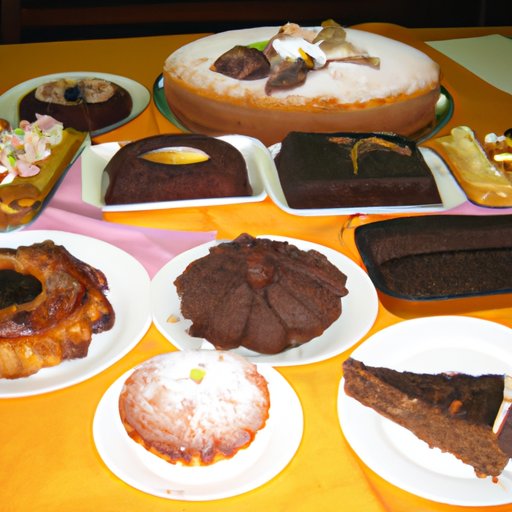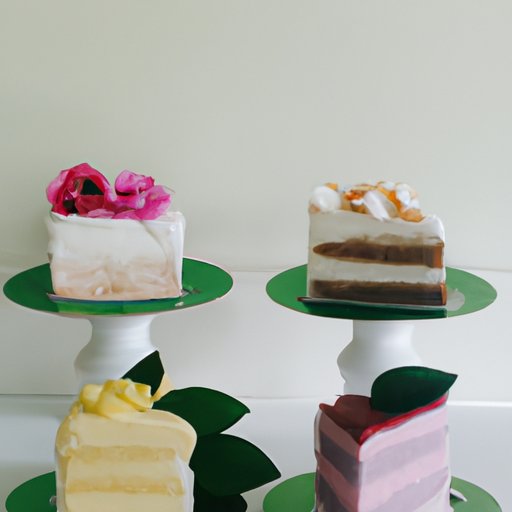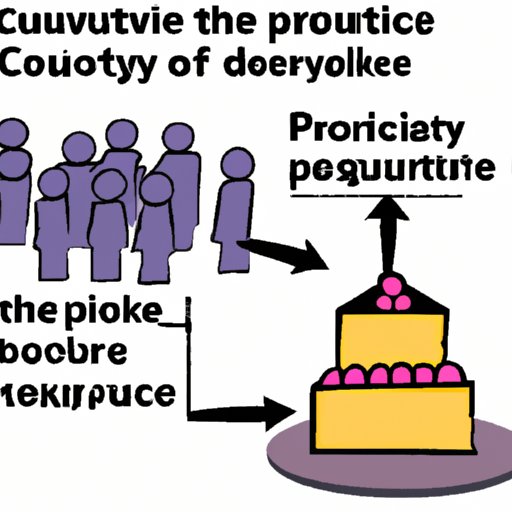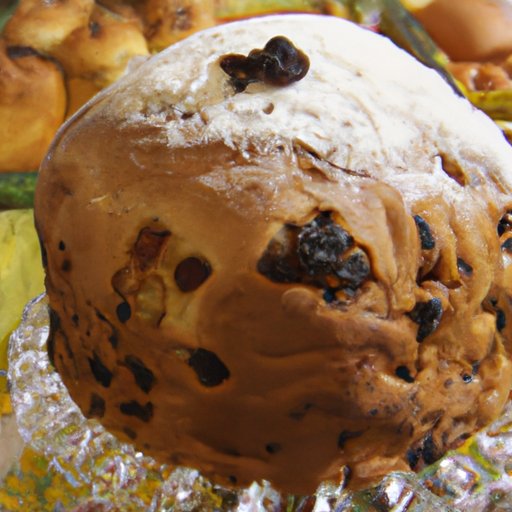Introduction
Cake is a universally beloved dessert that often brings joy to special occasions such as birthdays, anniversaries, and holidays. But who invented cake? How did this delectable treat come to be? In this article, we’ll explore the history of cake and investigate who invented it. We’ll examine the ancient origins of cake and how different cultures have contributed to its evolution over time. We’ll also look at the impact of cake on society and how it has been used as a sign of celebration, wealth, and hospitality.
A Historical Overview of the Invention of Cake
The origin of cake is unclear, but historians believe it dates back thousands of years. Ancient Egyptians are credited with inventing the first cakes, which were made from barley, oats, millet, wheat, and rye. These cakes were unleavened and sweetened with honey. The ancient Romans also baked cakes using flour, milk, eggs, nuts, and raisins, and they decorated them with fruits, nuts, and honey. However, these cakes were not like the modern-day cakes we know today.
There are various accounts of who invented cake. Some say it was the ancient Greeks who first created a cake made with honey, cheese, and flour. Others claim it was the medieval Europeans who developed the first sponge cakes, which were made with eggs, sugar, and flour. Still others believe it was the Chinese and Japanese who perfected the art of cake-making by adding butter, cream, and other ingredients to their cakes.
Exploring Different Accounts of Who Invented Cake
Ancient Egyptian and Roman recipes provide insight into how cakes were made in antiquity. According to research conducted by the American Institute for Roman Culture, ancient bakers used a variety of ingredients to make their cakes, including flour, honey, oil, eggs, spices, fruits, and nuts. The cakes were often served as part of religious ceremonies or as offerings to the gods. They were also used in wedding ceremonies and feasts.
Medieval European cake-making traditions also influenced the development of cake. During this time, cooks would bake small cakes and biscuits using yeast, eggs, and flour. These cakes were usually flavored with spices, fruits, and nuts, and they were often decorated with icing or glazes. By the 15th century, sponge cakes had become popular and they remained a favorite for centuries afterwards.
Chinese and Japanese contributions to cake-making should also not be overlooked. In China, cakes were made with rice flour and topped with sweet bean paste or lotus seed paste. In Japan, cakes were prepared with mochi (rice flour) and azuki beans. Both countries also experimented with different kinds of fillings and toppings, such as chestnut, sesame, and red bean pastes.
How Ancient Recipes Influenced Modern Cakes
Modern cakes owe a lot to their ancient predecessors. Many of the ingredients used in ancient recipes are still used today, such as flour, eggs, butter, milk, sugar, and spices. Ancient recipes also provided inspiration for modern cake decorations, such as marzipan, royal icing, and fondant. Furthermore, many of the techniques used in ancient cake-making, such as beating egg whites to create a light texture, are still employed today.
Popular ingredients used in ancient cake recipes include honey, molasses, and syrups, which all add sweetness and moisture to cakes. Nuts, dried fruits, and spices were also frequently used to give cakes flavor. In addition, citrus fruits were often added to enhance the flavor and aroma of cakes.

An Examination of Different Types of Cakes: From Ancient to Modern
Throughout history, different types of cakes have been enjoyed by people around the world. In ancient times, cakes were generally flat and unleavened. They were often made with grains and sweetened with honey. As time progressed, cakes became more complex and were made with a variety of ingredients, such as flour, eggs, butter, milk, and sugar. Today, cakes come in a wide variety of shapes and sizes and can be filled with any number of delicious ingredients.
Changes in cake types over time have also occurred. For example, sponge cakes were introduced in the 15th century and they remain popular today. In the 19th century, layer cakes became fashionable, and in the 20th century, cupcakes gained popularity. More recently, cheesecakes, chiffon cakes, and red velvet cakes have become popular choices.

The Evolution of Cake Throughout History
The development of cake-making techniques has also evolved over time. In the Middle Ages, cakes were cooked in ovens or over open fires. By the 18th century, baking pans had been invented and cakes could be cooked in the oven more quickly and easily. In the 19th century, baking powder was invented, which enabled cakes to rise more quickly and evenly. With the invention of electric mixers in the 20th century, cakes could be mixed and baked more efficiently.
The industrialization of cake-making has also had an immense impact on the production of cakes. Industrial bakeries began appearing in the late 19th century, and they allowed cakes to be produced in large quantities and sold at a lower cost. This enabled cakes to become more widely available to the public.

Understanding the Impact of Cake on Society
Cake has had a significant impact on society. Celebration cakes, such as birthday and wedding cakes, are often used to mark special occasions. Cakes can also be a symbol of wealth and status; for example, in the 18th century, wealthy families would display elaborate cakes as a sign of their social standing. Additionally, cakes are often seen as a sign of hospitality, as they are often served to guests when they visit someone’s home.
Conclusion
In conclusion, cake has a long and varied history. Its ancient origins date back thousands of years, and different cultures have contributed to its evolution over time. Ancient recipes have influenced modern cakes, and the development of cake-making techniques has enabled cakes to be produced more quickly and easily. Furthermore, cake has had a significant impact on society, as it is often used to celebrate special occasions, as a symbol of wealth and status, and as a sign of hospitality.
(Note: Is this article not meeting your expectations? Do you have knowledge or insights to share? Unlock new opportunities and expand your reach by joining our authors team. Click Registration to join us and share your expertise with our readers.)
